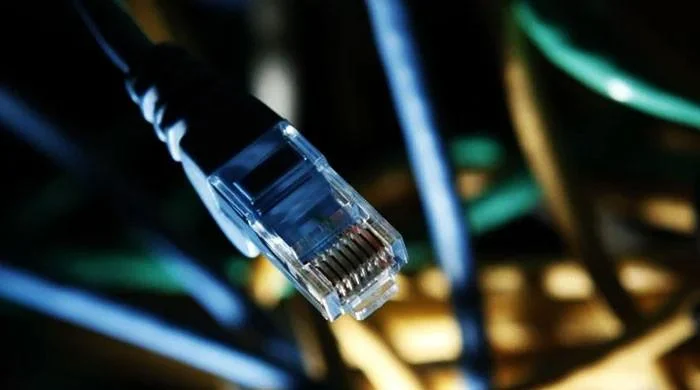Pakistan’s telecommunication regulator confirms that it is upgrading its Web Monitoring System (WMS), due to which the country’s internet users will continue to face episodes of internet outages ahead of the general election.
On January 22, Ahmed Shamim Pirzada, the director general of the state-run Pakistan Telecommunication Authority (PTA), told the media that recent incidents of nationwide internet slowdown were “technical glitches” as the PTA was updating one of its software.
Pirzada then warned that the “glitches” would continue for the next two to three months, even though Pakistan is slated to hold its parliamentary election in two weeks, on February 8.
That software, being upgraded, is the Web Management System (WMS), a spokesperson of the PTA confirmed to Geo Fact Check over the phone.
“The deployment/upgradation/testing of Web Management System(s) is currently ongoing on landing stations for internet submarine cables i.e Sea-Me-We 3,4,5 etc,” the spokesperson added, without further elaborating.
The PTA official further claimed that the system was being deployed by the telecommunication operators in the country.
“PTA has issued directions to them [telecom companies] to ensure that any related technical activity should not impact the internet services for telecom users,” the spokesperson said.
But digital rights activist Usama Khilji calls PTA’s response “inconsistent” and contradictory.
“First, the PTA says that the deployment [of the WMS] is happening on the internet submarine cable but then it blames telecom operators, so which is it?,” Khilji asked, “Under the WMS, the telecom operators have no say. It is the PTA that directly blocks content through the internet cable and has complete control.”
What is the Web Monitoring System?
Pakistan purchased the WMS system in December 2019, for around $18 million from the Canadian firm Sandvine, explains Khilji.
The WMS is an all-encompassing surveillance system of the internet traffic, which uses Deep Packet Inspection technology to empower the PTA to implement gateway-level blocking and censorship, he added.
When Geo Fact Check asked the PTA why the upgradation was being carried out now, in the run-up to the national polls, since internet disruptions were affecting Pakistani voters from accessing crucial information about the election, the PTA spokesperson said that the “deployment of the WMS” had been underway since December 2023.
“It is the requirement for complying with various court orders related to objectionable internet content including blasphemous content under the Prevention of Electronic Crimes Act 2016,” the official alleged.
In the past over one month, there have been three episodes of internet slowdown and blockage in the country — on December 17, January 7 and January 20.
On all three days former prime minister Imran Khan’s political party, the Pakistan Tehreek-e-Insaf, had organised online rallies and telethons.
“Why do they [PTA] keep blocking social media only when PTI is holding an online event?” asks Khilji, adding that the PTA could have upgraded the WMS when the coalition government was in power between April 2022 and August 2023, or when the caretaker government took over in August.
“Why did they wait till the time of the election to carry forward this upgrade?” he further questions.
How will an internet slow down affect the election on February 8?
An internet disruption on the day of the national election could cause delays in the final compilation of the results, admits an official of the Election Commission of Pakistan [ECP].
“Our [ECP’s] Project Management Unit is in touch with PTA,” Nadeem Haider, the spokesperson of the ECP told Geo Fact Check, “We have asked for uninterrupted power [internet] supply and have told PTA too.”
But ECP has also prepared a Plan B for “a worst-case scenario”.
The electoral body’s newly-launched result tabulation system, the Election Management System, has been designed to be able to run offline as well, explains Haider.
Even with no internet, the presiding officer (PO) can continue to compile the tally on Form-45. Once the result has been recorded, the presiding officers have been instructed by the ECP to take a snapshot from their phones of Form-45 and immediately send it to the returning officer (RO).
“If there is no internet, at least we will have a record of when the PO took a picture of Form 45 and from where [location],” Haider said, “Also if there is no internet the POs have been told to physically rush to the RO office and hand deliver the result.”
But Haider adds that if for some reason mobile services in the country are suspended on the day of the election then “that will be an issue”.
“Then all the forms and results will need to be delivered physically by the election officials,” he said, adding that for that possibility the ECP has decided to also keep a manual record of all the results on Microsoft Excel sheets.

